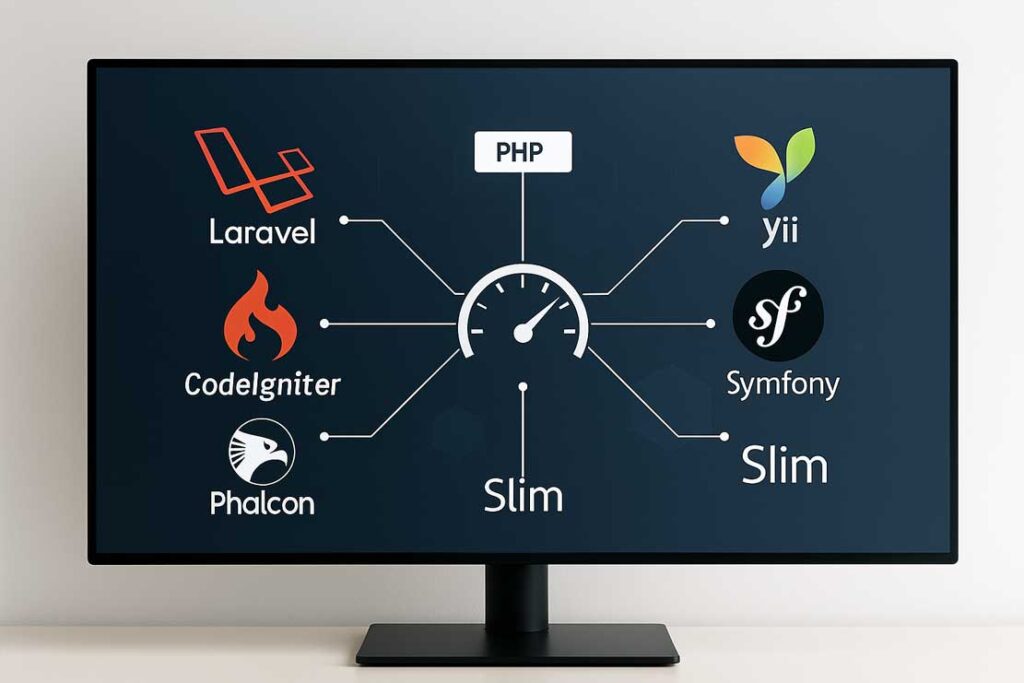Table of Contents:
PHP Frameworks Compared
The world of PHP development continues to evolve rapidly, and frameworks have become essential tools for creating robust, scalable, and maintainable web applications. Choosing the right PHP framework can dramatically affect performance, security, and productivity.
This guide offers a detailed comparison of popular PHP frameworks — Laravel, CodeIgniter, Symfony, Yii, Phalcon, and Slim — to help you decide which one best fits your project in 2025-26 and beyond.
Why Use a PHP Framework?
A PHP framework provides a structured foundation for developers. It eliminates repetitive coding, promotes cleaner architecture, and simplifies complex development tasks such as routing, authentication, and database interaction.
Key benefits include:
- Faster development with built-in libraries
- Enhanced security and data validation
- Reusable code and modular architecture
- Easier collaboration in large projects
- Long-term maintainability and scalability
Laravel: The Most Popular PHP Framework
Why Laravel is the best PHP framework for beginners and professionals
Laravel is the most widely used PHP framework in modern web development. Known for its elegant syntax and powerful tools, it’s ideal for developers who want to build high-performance, secure, and scalable applications quickly.
Highlights:
- MVC architecture for clean separation of logic and presentation
- Built-in authentication and authorization
- Eloquent ORM for simplified database management
- Blade templating engine for dynamic UI rendering
- Artisan CLI for automation and migrations
Best For:
Enterprise web applications, SaaS products, and RESTful APIs.
CodeIgniter: Lightweight and Fast
Best lightweight PHP framework for small business websites
CodeIgniter is famous for its speed, simplicity, and minimal footprint. It’s an excellent choice for developers who prefer flexibility and low configuration.
Highlights:
- Extremely lightweight and fast
- Simple setup with minimal dependencies
- Ideal for shared hosting environments
- Small learning curve
Best For:
Small to medium-sized projects, prototyping, and performance-oriented web apps.
Symfony: Enterprise-Grade and Modular
Symfony vs Laravel: Which PHP framework suits enterprise projects
Symfony powers some of the largest web applications in the world. It’s a component-based framework that provides unmatched flexibility and scalability.
Highlights:
- High-performance reusable components
- Long-term support (LTS) versions
- Built-in testing and debugging tools
- Follows strict PHP standards (PSR compliance)
Best For:
Large enterprise solutions, CMS platforms, and complex business applications.
Yii Framework: Secure and Efficient
Yii framework advantages for secure PHP application development
Yii is known for its high performance and security-first approach. It includes features for input validation, authentication, and authorization out of the box.
Highlights:
- Gii code generator for rapid development
- Strong caching support for speed
- Advanced security mechanisms
- Active Record ORM for easy database handling
Best For:
E-commerce, portals, and projects that prioritize speed and security.
Phalcon: The Fastest PHP Framework
Phalcon PHP performance comparison 2025
Phalcon stands out because it’s implemented as a C-extension, making it the fastest PHP framework available. It minimizes overhead and optimizes memory usage.
Highlights:
- High-speed execution
- Low resource consumption
- Dependency injection and ORM support
- Excellent for APIs and microservices
Best For:
Performance-critical systems and high-traffic web applications.
Slim Framework: Minimal and API-Focused
Best PHP micro framework for RESTful APIs
Slim is a micro-framework for developers building REST APIs or lightweight web apps. It focuses on simplicity and minimalism.
Highlights:
- Minimal setup with powerful routing
- Middleware support for customization
- Ideal for JSON-based REST APIs
- Fast and memory-efficient
Best For:
Developers building APIs, microservices, or single-purpose applications.
Feature Comparison Table
| Feature / Framework | Laravel | CodeIgniter | Symfony | Yii | Phalcon | Slim |
|---|---|---|---|---|---|---|
| Architecture | MVC | MVC | MVC | MVC | MVC | Micro |
| Learning Curve | Medium | Easy | Hard | Medium | Medium | Easy |
| Speed | Moderate | Fast | Moderate | Fast | Very Fast | Very Fast |
| Security | High | Moderate | High | High | High | Moderate |
| Best Use | Large Apps | Small Apps | Enterprise | Secure Sites | High-Performance | APIs |
PHP frameworks compared, best PHP frameworks 2025, Laravel vs CodeIgniter, Symfony vs Laravel, PHP web development frameworks, PHP MVC comparison, PHP performance benchmarks, choose PHP framework
How to Choose the Right PHP Framework
Choosing the right framework depends on your project goals, team skills, and long-term maintenance plans.
Consider these factors:
- Project complexity and size
- Developer experience level
- Hosting environment
- Performance requirements
- Community support and documentation
Example:
If you’re building a fast MVP → use CodeIgniter or Slim.
If you need scalability and structure → choose Laravel or Symfony.
For performance-critical apps → go with Phalcon.
👉 Learn the step-by-step process to Build a CMS with PHP for practical framework application.
👉 Visit the PHP Tutorials Section to strengthen your core PHP knowledge before starting with frameworks.
Frequently Asked Questions (FAQ)
Q1. What is the best PHP framework in 2025?
Laravel continues to be the most popular PHP framework due to its ecosystem, scalability, and ease of use.
Q2. Which PHP framework is fastest?
Phalcon is considered the fastest, as it’s built in C and compiled as a PHP extension.
Q3. Which framework is best for beginners?
CodeIgniter is beginner-friendly due to its simplicity and minimal setup requirements.
Q4. Is Laravel better than Symfony?
Both are powerful, but Laravel is easier to learn, while Symfony is more modular and suitable for enterprise-level projects.
Q5. Which PHP framework is best for REST APIs?
Slim Framework is the most lightweight and efficient option for developing RESTful APIs.


